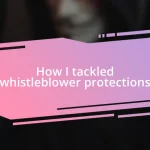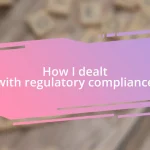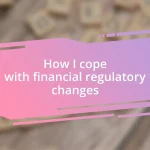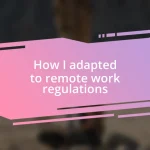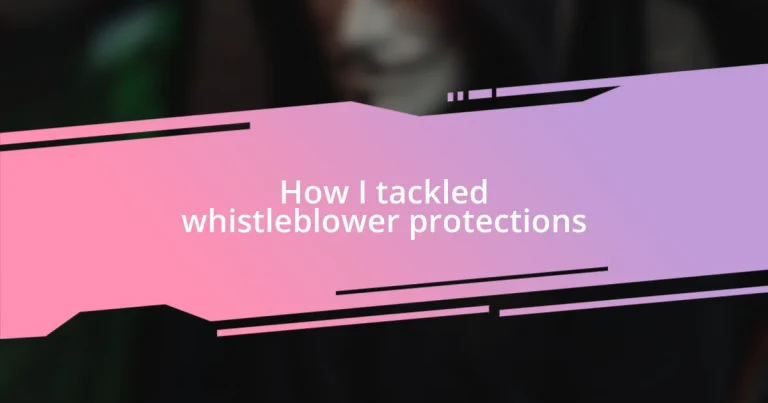Key takeaways:
- Whistleblower protections legally safeguard individuals reporting misconduct from retaliation, empowering them to speak out without fear.
- Reporting wrongdoing fosters a culture of integrity, accountability, and can lead to significant improvements in workplace policies and practices.
- Challenges faced by whistleblowers, including emotional turmoil and potential backlash, highlight the need for supportive resources and legal guidance.
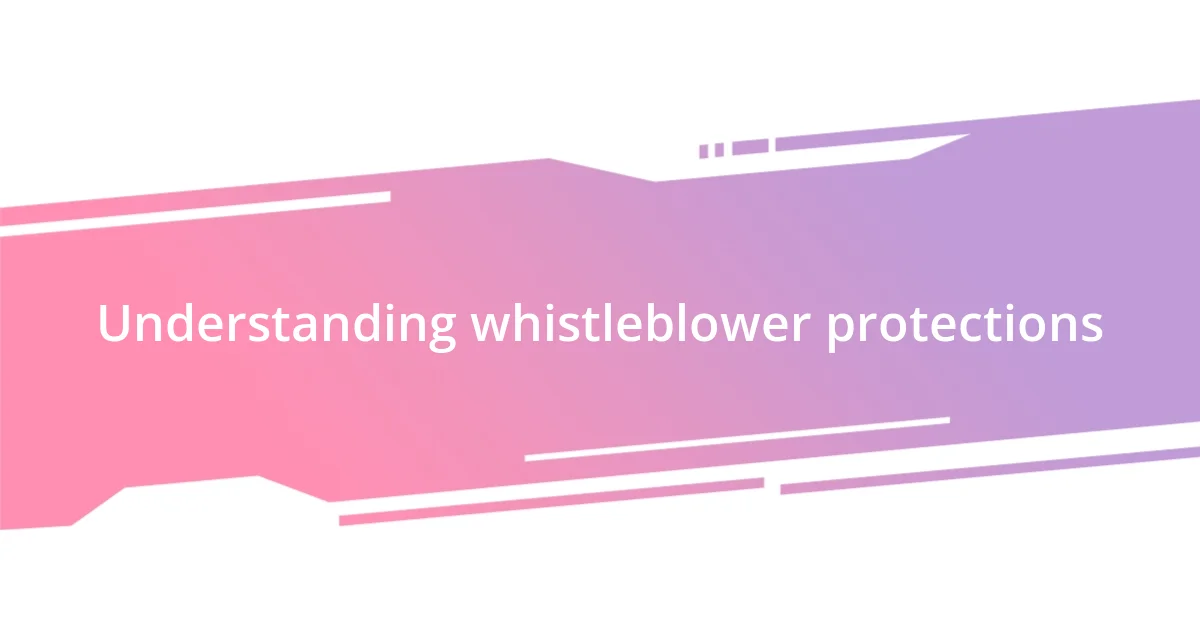
Understanding whistleblower protections
Whistleblower protections are legal safeguards designed to shield individuals who report misconduct from retaliation. I remember my first encounter with these protections; it felt like a silent lifeline in a tumultuous sea of uncertainty. Imagine feeling the weight of truth on your shoulders but fearing the consequences of speaking out—whistleblower protections allow you to share that truth without fear.
These protections vary by jurisdiction, but they generally ensure that employees can report illegal or unethical behavior without jeopardizing their jobs or facing punitive actions. It’s reassuring to know that laws exist to support those who courageously come forward. Have you ever wondered how society would function without these protections? I often think that whistleblowers are the unsung heroes, shining a light on issues that others might prefer to remain hidden.
In my experience, understanding the nuances of these protections can empower individuals to take action. Educating oneself about the specific laws that apply can be a game changer. It’s a way to transform fear into empowerment, knowing that you have not only a voice but also the backing of legal frameworks designed to support you. Wouldn’t you agree that feeling protected while advocating for what is right is essential in any workplace?
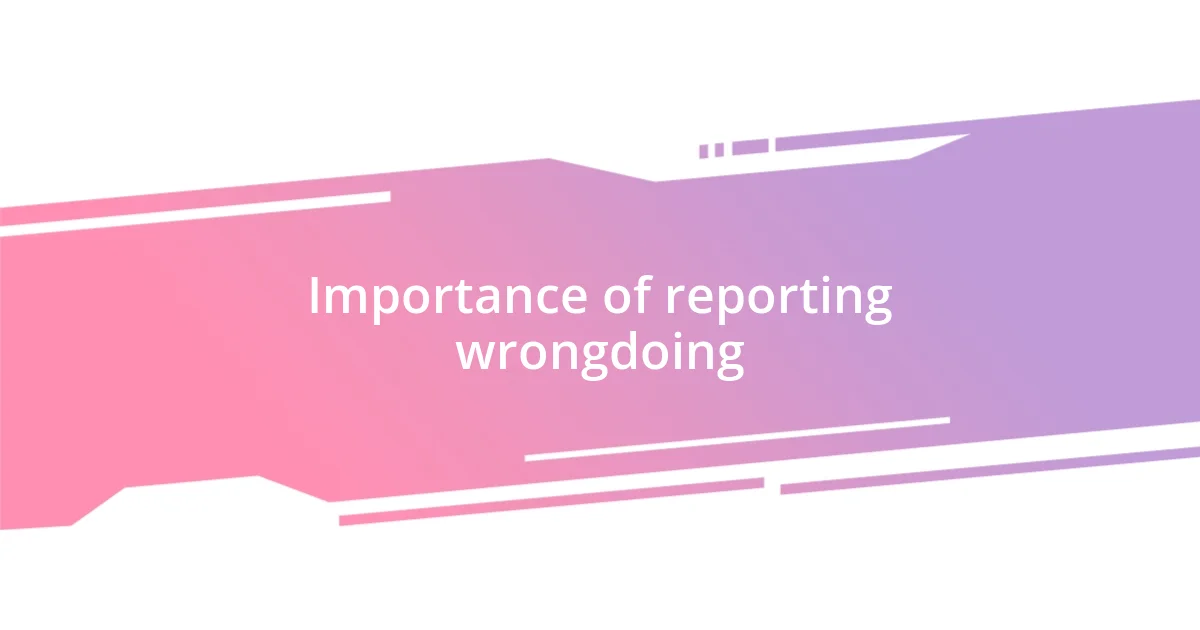
Importance of reporting wrongdoing
Reporting wrongdoing is not just about speaking out; it’s about fostering a culture of integrity. When individuals come forward, they not only protect the organization but also contribute to a safer environment for everyone. I recall a time when a coworker disclosed unethical practices; it led to investigations that ultimately improved our workplace. Witnessing this transformation reminded me of the cascading effect that one brave act can have on morale and trust within a community.
Moreover, the act of reporting acts as a deterrent against future misconduct. Knowing that there are consequences for unethical behavior can change the dynamics of a workplace significantly. I remember feeling a sense of relief when I knew people were willing to step forward. It was as if a barrier had been broken, allowing for open conversations about ethics and compliance. This kind of vigilance creates an atmosphere where individuals feel accountable, and that can only lead to improvement.
Lastly, it’s worth mentioning that reporting wrongdoing often fuels accountability at higher levels. I’ve seen senior leadership face scrutiny after whistleblower reports, leading to a re-evaluation of policies that were once overlooked. This isn’t just about one person’s journey—it’s about the collective growth that stems from commitment to ethical standards. Isn’t it inspiring to think that one report can lead to an entire organization reassessing its values?
| Aspect | Importance of Reporting Wrongdoing |
|---|---|
| Cultural Integrity | Encourages transparency and trust among employees. |
| Deterrent Effect | Promotes accountability and discourages future misbehavior. |
| Organizational Growth | Leads to improved policies and practices at all levels. |
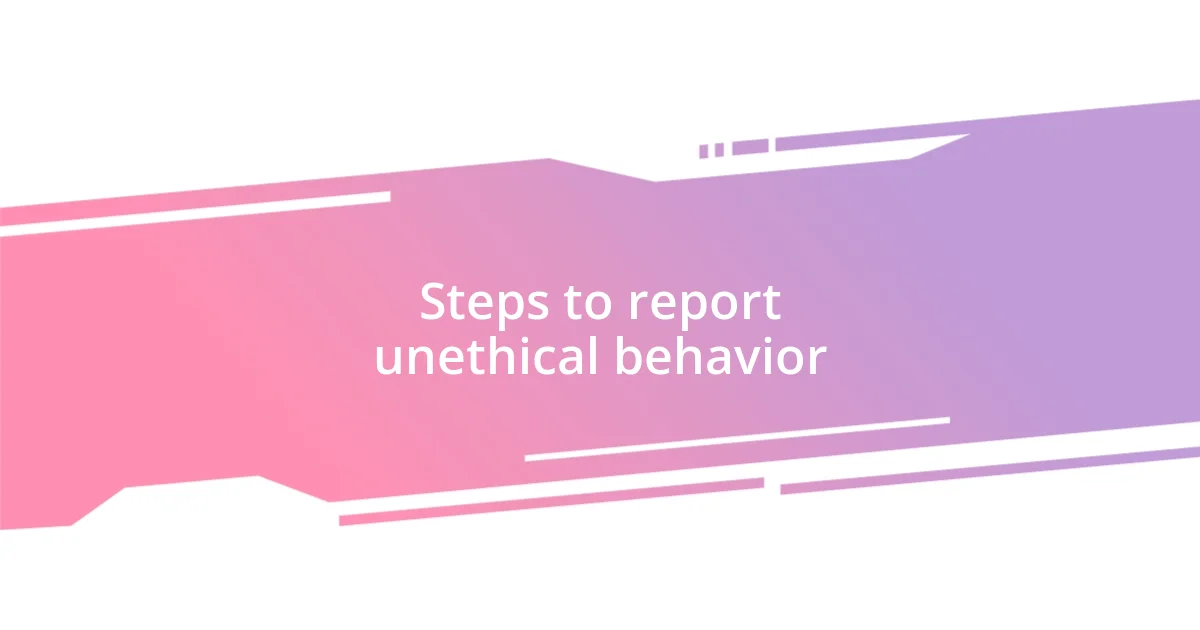
Steps to report unethical behavior
When you decide to report unethical behavior, it’s crucial to approach the situation with clarity and purpose. Drawing from my own experience, I remember the nervous excitement I felt before making my first report. It’s like standing at the edge of a diving board—terrifying, yet invigorating. To make the process smoother, consider the following steps:
- Document Everything: Keep detailed records of the unethical behavior. This includes dates, times, locations, and any witnesses who might support your claims.
- Know Your Company’s Policies: Familiarize yourself with your organization’s reporting procedures. This knowledge can prepare you for what to expect and who to approach.
- Choose the Right Channel: Decide whether to report to your supervisor, HR, or through an anonymous hotline. Your choice can impact how effectively the issue is addressed.
- Be Candid and Specific: When you report, share the information in a straightforward manner. Avoid embellishments, as clarity will strengthen your case.
Taking those initial steps can be daunting, but it’s essential to remember that you’re advocating for a healthier workplace. I recall a colleague who bravely stepped forward about a serious violation. Her meticulous notes and preparation made a profound difference in how management responded. It was empowering to see her efforts validated.
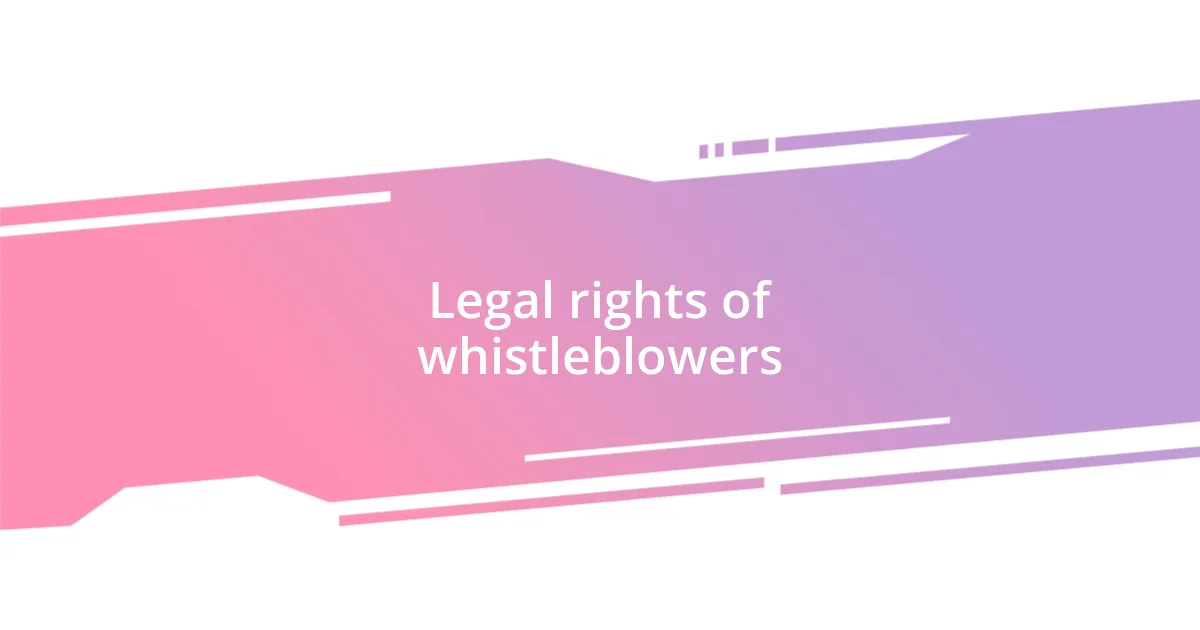
Legal rights of whistleblowers
Whistleblowers enjoy several legal protections designed to safeguard them from retaliation. These rights often include protections against wrongful termination, demotion, or harassment for those who disclose unethical practices. I once spoke with a former whistleblower who shared how knowing there were laws in place made him feel empowered to come forward. Does knowing you have that legal shield give you the confidence to report?
Under the Whistleblower Protection Act in the United States, employees are not only protected from retaliation but also encouraged to report misconduct. I remember the relief in a friend’s voice when she realized that her disclosures about safety violations at her workplace could not only protect her job but also potentially save lives. It’s heartening to know that such measures are in place, right?
Additionally, many states have their own laws that further enhance protection for whistleblowers, providing various channels for reporting. I encountered someone who navigated this intricate landscape, and hearing about her experience illuminated how important it is to be informed. Understanding these legal rights equips potential whistleblowers with the tools needed to act without fear, fostering a culture where accountability thrives.
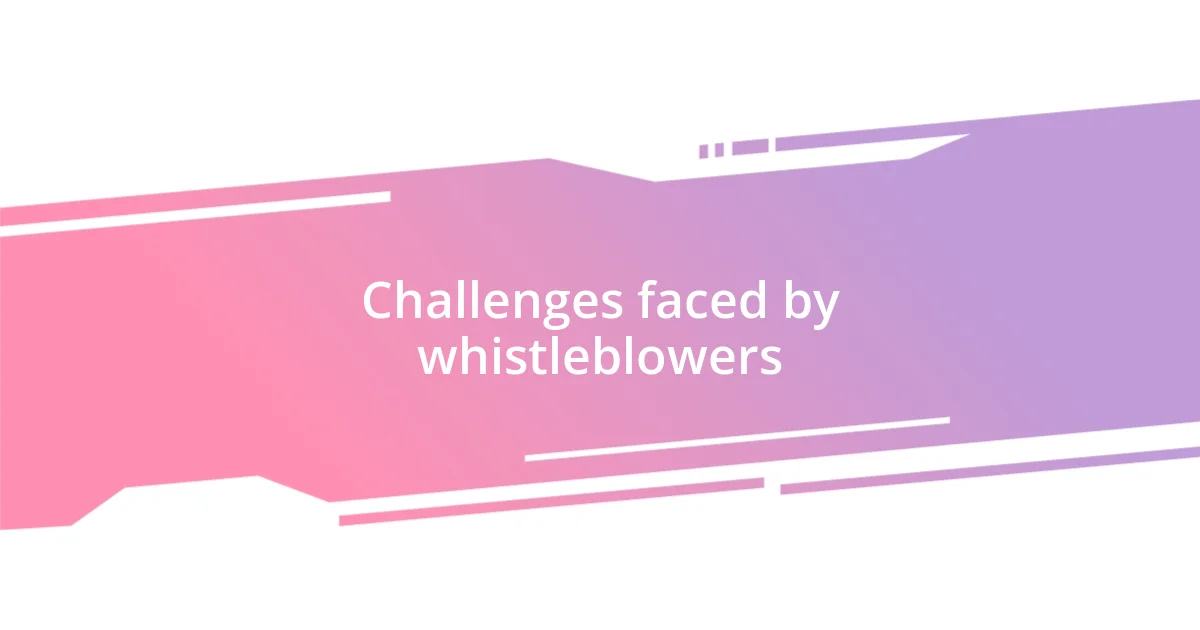
Challenges faced by whistleblowers
Facing the decision to blow the whistle is fraught with obstacles. Whistleblowers often encounter intense emotional turmoil; I remember a time when a friend confided in me about his dread after reporting financial fraud. The fear of isolation and retaliation gnawed at him, making it difficult to focus on anything else.
Another significant challenge is the potential backlash from colleagues and management. I’ve seen firsthand how even well-intentioned reports can lead to workplace alienation. People might view the whistleblower as a traitor rather than a hero, which can create an unbearable atmosphere. Why should it be that speaking up for what’s right can feel like a personal attack?
Moreover, the lengthy legal processes can be daunting and discouraging. In my experience, a colleague who reported misconduct spent months navigating a maze of legal jargon and bureaucracy. It’s disheartening to think that the very system designed to protect them can also become a source of frustration. How can we foster an environment where those courageous enough to speak out aren’t left feeling powerless?
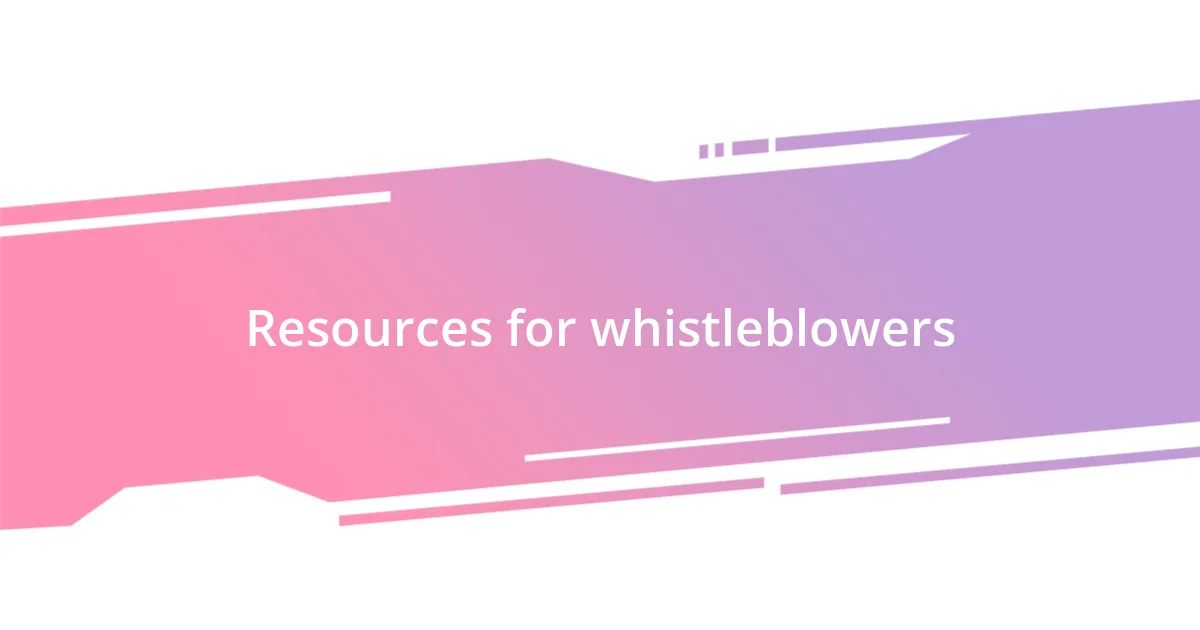
Resources for whistleblowers
When it comes to resources for whistleblowers, knowing where to turn is crucial. I remember a colleague who found solace in organizations like the Government Accountability Project, which offers legal advice and support. Just knowing that there are dedicated resources out there can alleviate some of the anxiety surrounding the decision to speak up. Have you considered reaching out to a hot-line or support group when exploring your options?
If you’re looking for legal guidance, the National Whistleblower Center provides a wealth of information and can connect you with experienced attorneys who specialize in whistleblower cases. I was amazed by how much clarity my friend gained after consulting with a lawyer who truly understood her rights. The empowerment that comes from being well-informed cannot be overstated. Can understanding your legal terrain energize your resolve to report wrongdoing?
Additionally, many whistleblower organizations offer educational resources, including webinars and workshops that cover the ins and outs of the process. I once attended an event where a whistleblower shared their journey, and it was both enlightening and motivating. When you see others brave the storm, it can spark a sense of community and strength. Isn’t it comforting to know there’s a network of support ready to back you up?
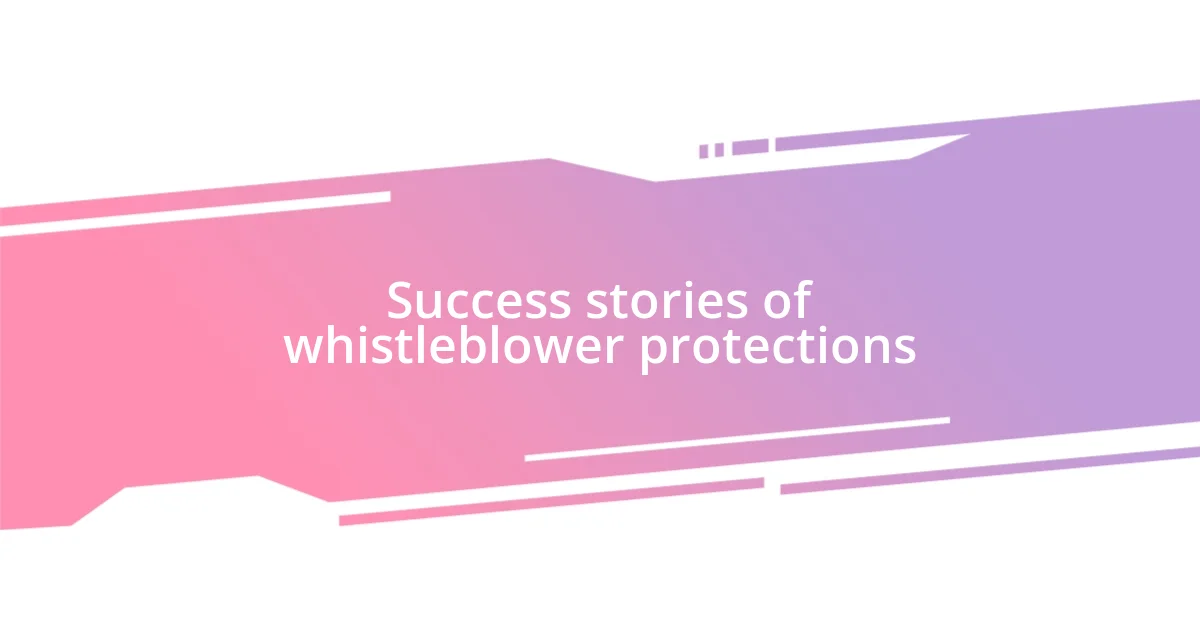
Success stories of whistleblower protections
One powerful success story that stands out to me is the case of Sherron Watkins, who famously blew the whistle on Enron in 2001. I remember feeling a mix of awe and empathy as I read about her courage to stand up against widespread corporate fraud. Her actions not only led to significant legal reforms but also set the stage for greater awareness around corporate accountability—don’t you think it’s inspiring when one person can initiate such profound change?
Another remarkable example is the impact of the Whistleblower Protection Act in the United States. I worked with a former government employee who had faced retaliation after exposing safety violations. After receiving support under this law, he not only regained his job but also helped implement crucial safety measures that protected countless workers. It made me wonder how many lives can be positively affected when we empower those who dare to speak out.
Moreover, I can’t overlook the courage of healthcare whistleblowers during the COVID-19 pandemic. A nurse I know shared her story about reporting unsafe conditions in her hospital. While the initial aftermath was overwhelming, her actions ultimately led to improved safety protocols that benefitted both staff and patients. Isn’t it incredible how, even in the face of intense opposition, a single act of bravery can ripple through an entire community?


